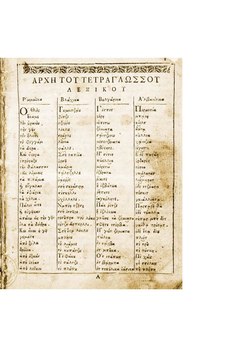Daniel Moscopolites
Daniel of Moscopole or Daniil of Moscopole (1754–1825; Aromanian: Daniil Moscopoleanu[1] or Moscopoleanlu;[2] Greek: Δανιήλ Μοσχοπολίτης, romanized: Daniil Moschopolitis), also known as Mihali Adami Hagi (Aromanian: Mihali Adami Hagi), was an Aromanian scholar from Moscopole and student of Theodoros Kavalliotis, an 18th/19th-century professor and director of New Academy of Moscopole.
Works
[edit]Daniel was an Aromanian,[3][4] and has been described as Hellenized.[5] In this period, Moscopole was an important Balkan city, the cultural and commercial center of the Aromanians and the site of the first printing press working in the Balkans.
Daniel, in his work, Εισαγωγική Διδασκαλία ("Introductory Instruction"),[6] compiled a combined dictionary of Greek (Romaika), Aromanian (Vlachika), Bulgarian (Vulgarika) and Albanian (Alvanitika). Daniel invited non-Greek speakers with this dictionary to learn the Greek language:[7]
Albanians, Vlachs, Bulgarians, speaker of other languages, rejoice, and prepare yourselves all of you to become Greeks (Romioi), leaving the barbarian language, voice and customs, that to your descendants will appear like myths.
Despite promoting the Greek language, Aromanian was Daniel's mother tongue. Furthermore, according to the Bulgarian scholar Aleksandăr Ničev, he did not know Greek very well.[4]
In 1794, he published in Venice[8] a dictionary of four modern Balkan languages (Greek, Albanian, Aromanian and Bulgarian). Many authors published his works in Greek and in Aromanian in the Greek alphabet. With his lexicographic work, Daniel hoped to persuade the Albanians, Aromanians and Bulgarians to abandon their "barbaric" tongues[9] and learn Greek, the "mother of knowledge". The book was republished in 1802 in Dubrovnik[10] or Venice.[11]
References
[edit]- ^ Piceava, Dumitru, ed. (2004). "Dimândarea pârinteascâ". Bana Armâneascâ (in Aromanian). Vol. 37–38, no. 3–4. p. 14.
shi hilji di zârtsinâ armâneascâca cumù eara Daniil Moscopoleanu...
- ^ Piceava, Dumitru, ed. (2005). "Mass-media armâneascâ". Bana Armâneascâ (in Aromanian). Vol. 39–40, no. 1–2. p. 2.
Daniil Moscopoleanlu tsi scoasicartea "Nvitsâturâ introducãtoari".
- ^ Korkmaz, Ramazan; Doğan, Gürkan, eds. (2016). Endangered Languages of the Caucasus and Beyond. BRILL. p. 84. ISBN 978-9004328693.
- ^ a b Lindstedt, Jouko (2016). "Multilingualism in the Central Balkans in late Ottoman times". In Makartsev, Maxim; Wahlström, Max (eds.). In search of the center and periphery: Linguistic attitudes, minorities, and landscapes in the Central Balkans. Slavica Helsingiensia. Vol. 49. University of Helsinki. pp. 51–67. ISBN 9789515125200.
- ^ Clogg, Richard (1996). Anatolica: Studies in the Greek East in the 18th and 19th Centuries. Variorum. p. 118. ISBN 978-0-86078-543-9.
What is particularly interesting about this passage is that its author, Hadji Daniel, was himself a hellenized Vlach from Moschopolis (now Voskopoljë in south - east Albania)
- ^ Central European University Press. Discourses of collective identity in Central and Southeast Europe (1770–1945): texts and commentaries. Central European University Press, 2006 ISBN 978-963-7326-52-3, p. 67.
- ^ Kostantaras Dean J.. Infamy and revolt: the rise of the national problem in early modern Greek thought. East European Monographs, 2006, ISBN 978-0-88033-581-2, p. 96.
- ^ Nistor Bardu, "Eighteenth Century Aromanian Writers: the Enlightenment and the Awakening of National and Balkan Consciousness", p. 97 in Philologica Jassyensia 3, no. 1 (2007): 93–102.
- ^ Nistor Bardu, "Eighteenth Century Aromanian Writers: the Enlightenment and the Awakening of National and Balkan Consciousness", p. 94 in Philologica Jassyensia 3, no. 1 (2007): 93–102.
- ^ "Четириезичният речник на Даниил (гръцка и българска част). Годишник на Софийския университет. Факултет по западни филологии, т. LXX, София, 1976, стр. 5-180.
- ^ J. Kristophson, Das Lexikon Tetraglosson des Daniil Moschopolitis, in: Zeitschrift für Balkanologie, 10 (1974), pp. 7-128.
External links
[edit]- Εισαγωγική Διδασκαλία (Introductory instruction), 1802
Text is available under the CC BY-SA 4.0 license; additional terms may apply.
Images, videos and audio are available under their respective licenses.

